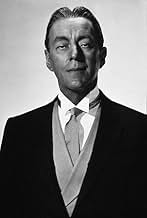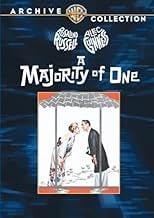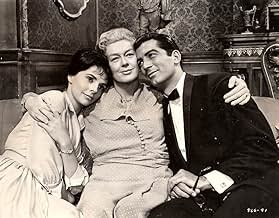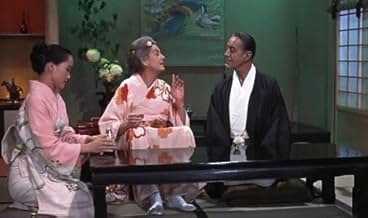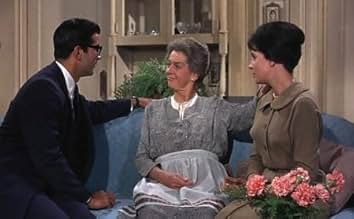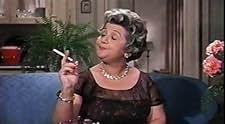IMDb-BEWERTUNG
6,7/10
1281
IHRE BEWERTUNG
Füge eine Handlung in deiner Sprache hinzuA gentle love story about a Japanese businessman and widower, and a Brooklyn widow. But before a happy ending can ensue, they must learn again the lessons of tolerance, kindness, and forgive... Alles lesenA gentle love story about a Japanese businessman and widower, and a Brooklyn widow. But before a happy ending can ensue, they must learn again the lessons of tolerance, kindness, and forgiveness.A gentle love story about a Japanese businessman and widower, and a Brooklyn widow. But before a happy ending can ensue, they must learn again the lessons of tolerance, kindness, and forgiveness.
- Für 1 Oscar nominiert
- 3 Gewinne & 4 Nominierungen insgesamt
Mae Questel
- Essie Rubin
- (as Mae Questal)
Harriet E. MacGibbon
- Lily Putnam
- (as Harriet MacGibbon)
Lillian Adams
- Mrs. Stein
- (Nicht genannt)
Leon Alton
- Ship Passenger
- (Nicht genannt)
Monya Andre
- Ship Passenger
- (Nicht genannt)
Mary Chan
- Spectator at Disembarkation
- (Nicht genannt)
Spencer Chan
- Ship Passenger
- (Nicht genannt)
Handlung
WUSSTEST DU SCHON:
- WissenswertesWhen Eddie is repairing Mrs. Jacoby's TV, rather than actually shooting the scene with material already selected and pre-recorded to be seen on the TV's screen, the filmmakers used another, less expensive trick; since TV scan rates are not the same as film, whenever a TV is seen (and it's showing something being broadcast), the dark scan lines are visible (and sometimes the TV's picture will "roll"). As this was still early in the TV-era, showing TVs broadcasting was something of a novelty, but it came with the aforementioned problems. To combat this, a "TV" was built (or, more accurately, something which looked like a TV). What's being shown on the "screen"' is actually film, which is being projected from behind the scene, and with the aid of a mirror, and a semi-translucent material to give the illusion of a screen, the result is that a high-quality image is seen, and there's no problem synching camera with TV.
- PatzerThe steering wheel of the taxi cab is on the wrong side.
- VerbindungenReferenced in The Human Jungle: Struggle for a Mind (1964)
- SoundtracksWhere Am I? (Am I in Heaven?)
(uncredited)
Music by Harry Warren
Played when Mrs. Jacoby and Mr. Asano discuss the dateline and Russia on board the ship
Ausgewählte Rezension
I've never seen another love story like A Majority of One. A story of two elderly individuals who are worlds apart having to overcome their racial prejudice, as well as being one of the few films in existence about love at old age. These imperfect and flawed characters feel so real and human, and while two and a half hours may seem overlong, I believe this time is justified. I wish more films could have the level of honest storytelling on display here.
The casting as Alec Guinness as a Japanese businessman has been widely criticised but I have disagree, I thought he was perfectly convincing in the role. His character is flawed, he's not the stereotypical wise old Asian man who is full of otherworldly knowledge which he easily could have been; he makes mistakes and doesn't have the answers to everything. Unlike many Asian characters in Hollywood films, he doesn't talk in broken English or exhibit any other commonly seen Asian stereotypes. Compared to Japanese stereotypes seen in World War II propaganda films 20 years earlier, A Majority of One was certainly a sign of progress.
Why should an actor's race limit the roles they can portray? If they play a character of a different race convincingly and in a non- offence manner, I don't see any reason to be up in arms. Should the roles an actor may want to attempt be limited to only characters of their race? I feel there is a double standard at play here; for a non white actor to be cast in a role or as a character originally conceived as white it will be viewed as forward thinking and progressive; for a white actor to be cast in a non white role then it is considered racist? Film is a business and you need big stars for a movie to be box office hit; how many Asian actors where big stars to American audiences in the early 60's. A movie like A Majority of One was an initial stepping stone to more equal representation in film, perhaps it not succeed as the film was not a box office success but the intent was there.
Rosalind Russell plays a potentially unlikable bigoted character but she manages to make the role endearing with her lovable nature and witty comebacks. I didn't see her character as an exaggerated stereotype. I've seen far more exaggerated representations of Jews in other films (do I even need to list examples?). Her character has lead an ingrown life in Brooklyn, however the movie shows the younger generation of her daughter and son in law holding more progressive views and are less conservative than their elders. Russell won't enter a bedroom wither son in law inhabiting without permission in case he isn't decent; her daughter on the other hand will just walk on in. Likewise the film highlights westernised trends in Japan such as Alec Guinness wearing a western flat cap tot the popularity of American music and Hollywood movies in Japan, while still acknowledging the anti American sentiment which exists in Japan. Also this movie has Eddie, a whiny little brat but in a funny way; I love this guy.
The casting as Alec Guinness as a Japanese businessman has been widely criticised but I have disagree, I thought he was perfectly convincing in the role. His character is flawed, he's not the stereotypical wise old Asian man who is full of otherworldly knowledge which he easily could have been; he makes mistakes and doesn't have the answers to everything. Unlike many Asian characters in Hollywood films, he doesn't talk in broken English or exhibit any other commonly seen Asian stereotypes. Compared to Japanese stereotypes seen in World War II propaganda films 20 years earlier, A Majority of One was certainly a sign of progress.
Why should an actor's race limit the roles they can portray? If they play a character of a different race convincingly and in a non- offence manner, I don't see any reason to be up in arms. Should the roles an actor may want to attempt be limited to only characters of their race? I feel there is a double standard at play here; for a non white actor to be cast in a role or as a character originally conceived as white it will be viewed as forward thinking and progressive; for a white actor to be cast in a non white role then it is considered racist? Film is a business and you need big stars for a movie to be box office hit; how many Asian actors where big stars to American audiences in the early 60's. A movie like A Majority of One was an initial stepping stone to more equal representation in film, perhaps it not succeed as the film was not a box office success but the intent was there.
Rosalind Russell plays a potentially unlikable bigoted character but she manages to make the role endearing with her lovable nature and witty comebacks. I didn't see her character as an exaggerated stereotype. I've seen far more exaggerated representations of Jews in other films (do I even need to list examples?). Her character has lead an ingrown life in Brooklyn, however the movie shows the younger generation of her daughter and son in law holding more progressive views and are less conservative than their elders. Russell won't enter a bedroom wither son in law inhabiting without permission in case he isn't decent; her daughter on the other hand will just walk on in. Likewise the film highlights westernised trends in Japan such as Alec Guinness wearing a western flat cap tot the popularity of American music and Hollywood movies in Japan, while still acknowledging the anti American sentiment which exists in Japan. Also this movie has Eddie, a whiny little brat but in a funny way; I love this guy.
Top-Auswahl
Melde dich zum Bewerten an und greife auf die Watchlist für personalisierte Empfehlungen zu.
Details
- Erscheinungsdatum
- Herkunftsland
- Sprachen
- Auch bekannt als
- A Majority of One
- Drehorte
- Produktionsfirma
- Weitere beteiligte Unternehmen bei IMDbPro anzeigen
- Laufzeit2 Stunden 36 Minuten
- Seitenverhältnis
- 1.85 : 1
Zu dieser Seite beitragen
Bearbeitung vorschlagen oder fehlenden Inhalt hinzufügen

Oberste Lücke
By what name was 1000 Meilen bis Yokohama (1961) officially released in India in English?
Antwort

